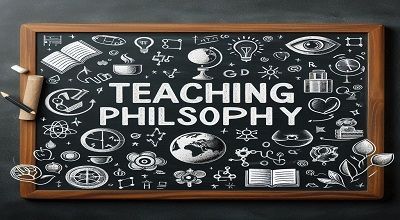Teaching Philosophy
Teaching philosophy, often referred to as a “philosophy of education,” is a personal statement or framework that outlines an educator’s beliefs, values, and principles about teaching and learning. It serves as a guide for educators in making instructional decisions and shaping their approach to education. Here are some examples of teaching philosophies:
- Progressivism: This philosophy emphasizes active learning, problem-solving, and critical thinking. Progressive educators believe that students learn best when they are actively engaged in the learning process and when the curriculum is relevant to their lives.
- Perennialism: Perennialists believe in a timeless and enduring body of knowledge that should form the basis of education. They emphasize the study of classic literature, history, philosophy, and mathematics as a way to develop intellectual and moral character.
- Essentialism: Essentialists believe in a core set of essential knowledge and skills that all students should learn. They advocate for a structured, content-focused curriculum and a teacher-centered approach to instruction.
- Constructivism: Constructivist educators believe that learning is an active process in which students construct their own understanding through exploration and interaction with their environment. They emphasize hands-on learning, inquiry-based approaches, and student-centered instruction.
- Existentialism: Existentialist philosophy in education focuses on individuality, freedom, and self-expression. Educators who align with this philosophy encourage students to explore their own values, choices, and meaning in life.
- Social Reconstructionism: Social reconstructionists believe that education should be a tool for social change and that schools should address social issues and injustices. They emphasize critical thinking, problem-solving, and activism.
Also Read….
- Behaviorism: Behaviorists focus on observable behaviors and believe that learning is a result of stimuli and responses. They advocate for clear objectives, structured reinforcement systems, and the use of rewards and punishments to shape behavior.
- Humanism: Humanist educators prioritize the development of the whole person, including emotional and social aspects. They emphasize nurturing students’ self-esteem, creativity, and interpersonal skills.
- Cultural Relevance: Educators who prioritize cultural relevance believe that teaching and curriculum should reflect the diverse backgrounds and experiences of students. They aim to make education more inclusive and responsive to the needs of diverse student populations.
- Holistic Education: Holistic educators focus on the integration of mind, body, and spirit in the learning process. They emphasize a well-rounded education that encompasses academic, physical, emotional, and spiritual growth.
- Montessori: Montessori education is based on the philosophy of Maria Montessori, which emphasizes self-directed learning, individualized instruction, and the importance of a prepared environment that encourages exploration and discovery.
- Place-Based Education: This philosophy encourages learning that is rooted in the local environment and community. It seeks to connect students to their surroundings and foster a sense of stewardship and engagement with the natural and cultural aspects of their region.
These are just a few examples of teaching philosophies, and educators often draw from multiple philosophies to create their own unique approach to teaching and learning. A teaching philosophy statement typically articulates an educator’s beliefs and principles, guiding their instructional practices and interactions with students.
Statement Of Teaching Philosophy
A statement of teaching philosophy is a reflective essay or document in which an educator articulates their beliefs, values, and principles about teaching and learning. It provides insight into the teacher’s approach to education, their goals, and their commitment to effective instruction. Below is an example of a statement of teaching philosophy:
Statement of Teaching Philosophy
As an educator, I believe that the purpose of education extends beyond the mere transmission of knowledge; it is a transformative process that shapes individuals and empowers them to reach their fullest potential. My teaching philosophy is grounded in several key principles:
1. Student-Centered Learning: I view students as active participants in their own learning journey. I aim to create a classroom environment that fosters curiosity, critical thinking, and self-motivated exploration. By engaging students in the learning process, I empower them to take ownership of their education.
2. Inclusivity and Diversity: I believe that every student brings a unique perspective and set of experiences to the classroom. Recognizing and respecting this diversity is crucial. I strive to create an inclusive environment where all students feel valued and supported. By embracing differences, we enrich the learning experience and prepare students for a diverse world.
3. Active Learning: Learning is most effective when it is active and experiential. I incorporate hands-on activities, group discussions, and real-world applications into my teaching methods. These approaches not only deepen understanding but also promote the development of problem-solving skills and critical thinking.
4. Lifelong Learning: Education is a lifelong journey, and I aim to instill a passion for learning in my students. Beyond the content of the curriculum, I encourage them to develop the skills and habits necessary for continuous learning, adaptability, and growth throughout their lives.
Extra Here…
5. Ethical and Responsible Citizenship: Education should not only empower students intellectually but also ethically and socially. I emphasize the importance of ethical behavior, empathy, and social responsibility. I believe that educated individuals have a responsibility to contribute positively to their communities and society as a whole.
6. Assessment for Growth: Assessment is not just a means of evaluating student performance; it is an opportunity for growth and improvement. I use a variety of assessment methods to provide constructive feedback and guide students toward their goals. Assessment should be transparent, fair, and focused on learning outcomes.
7. Adaptability: Effective teaching requires adaptability. I recognize that every student is unique, and I am committed to adjusting my teaching strategies to meet their needs. I also stay current with educational research and technology to ensure that my teaching methods remain relevant and effective.
In conclusion, my teaching philosophy is centered on the belief that education is a transformative and empowering process. By fostering student-centered learning, inclusivity, active learning, and ethical responsibility, I aim to inspire a love of learning and prepare students not only for academic success but also for a fulfilling and meaningful life beyond the classroom.
